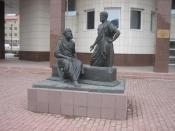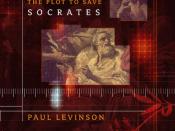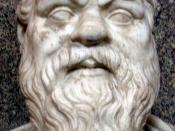The Republic by Plato is considered to be a crucial piece of writing in philosophical ethics. Plato, the author, is speaking through the voice and arguments of his mentor Socrates in search of answering one query: "What is Justice?" So, book I, which is found in the form of dialogues, circulates around defining justice and more precisely if one can actually offer an adequate definition of it. The scenario takes place at an old, well-respected man's house where Socrates himself doesn't offer any definitions, instead he destructs others definitions, specifically Cephalus', Polemarchus' and Thrasymachus'.
The conversation begins with discussing the lives of the elderly and evaluating it. Cephalus, the old man, is quiet content with his current life unlike most aged individuals. Acquiring wealth and fortune through hard work made his attitude regarding old age laid back and detached. He even admits that money made his life more comforting in accepting the part of the circle of life that required getting old.
Suddenly, Socrates drives the conversation onto a new subject: justice. Cephalus believes that "justice means living up to your legal obligations and being honest". Representing the interlocutor, Socrates refutes this view by exemplification: "returning a weapon to a madman is legal but unjust". Socrates also indirectly implies that life is unpredictable and tangled so it's very plausible for individuals to make wrong assessments about others and their circumstances. So in other words, one may think that his actions and beliefs are true when they really aren't. Such erroneous judgments are the outcome of utilizing fallacious principles like the one that Cephalus presented. So the refuting view aims at proving that paying back a debt is not always the just thing to do. With that said, Cephalus leaves the scene.
So, all in all, what can...


